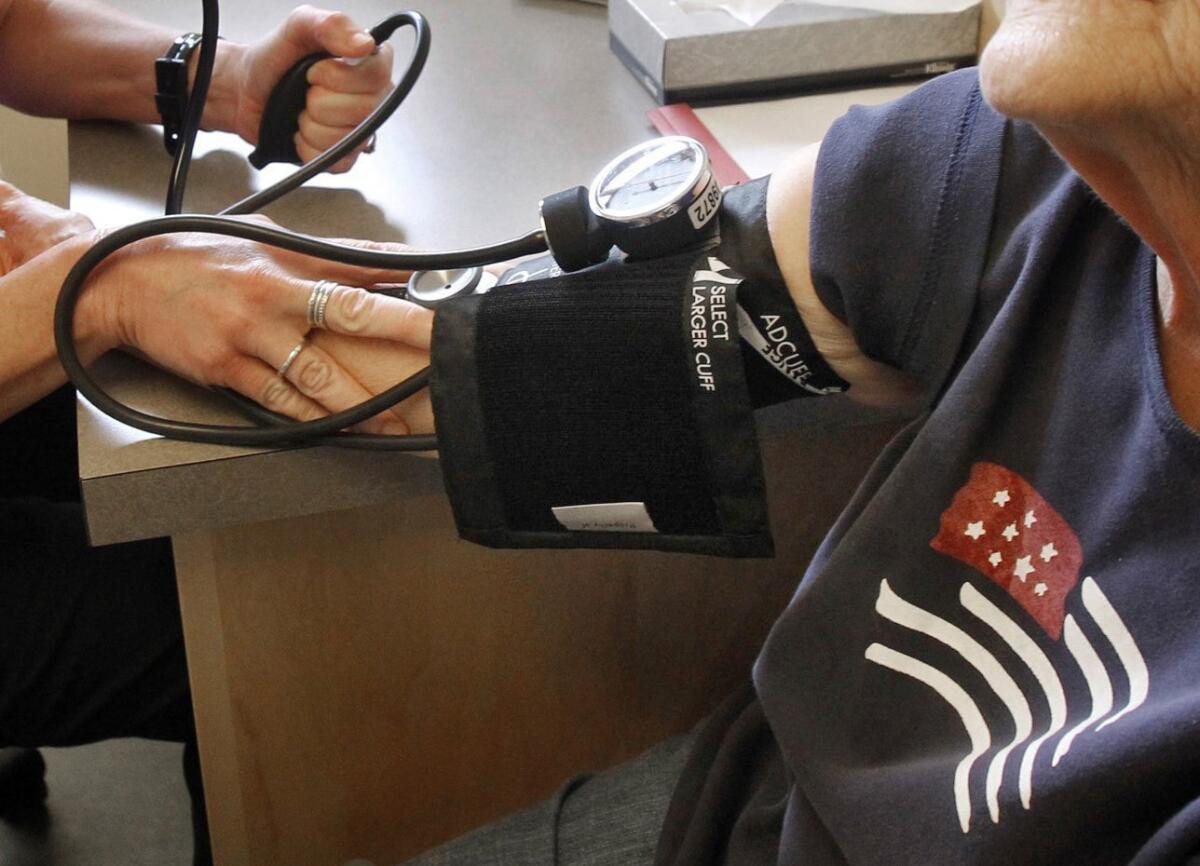Aggressive treatment of high blood pressure pays off for patients, study finds

A patient has her blood pressure checked by a registered nurse in Plainfield, Vt. A major new U.S. study shows that treating high blood pressure more aggressively than usual cuts the risk of heart disease and death in people over age 50, the National Institutes of Health said Friday.
Americans who take medication to control their high blood pressure may benefit by aiming for an even more aggressive target, U.S. researchers said Friday.
A government-sponsored study has found that patients who tried to get their systolic blood pressure down to 120 millimeters of mercury fared better than their peers who used the traditional target of 140 mm Hg. The patients who got the more intensive treatment were significantly less likely to suffer a heart attack or stroke or to die during the course of the study, the researchers said.
The Centers for Disease Control and Prevention estimates that about 70 million American adults have high blood pressure, or hypertension. Only about half of them have the condition under control. That makes them vulnerable to a range of health problems, including heart attacks, strokes and chronic heart failure.
High blood pressure contributes to nearly 1,000 deaths in the U.S. each day and costs the nation about $46 billion each year, the CDC says.
See the most-read stories this hour >>
The blood pressure reading you get at the doctor’s office includes two numbers. The top number measures systolic blood pressure, which is the pressure in the arteries when the heart muscle contracts, or beats. The bottom number measures diastolic blood pressure, which is the pressure in the arteries when the heart rests between beats. A reading of 120/80 mm Hg or below is considered normal.
The Systolic Blood Pressure Intervention Trial, or SPRINT, focused on the top number. It was sponsored by the National Institutes of Health and included more than 9,300 people with high blood pressure from throughout the United States and Puerto Rico. All of the study volunteers were at least 50 years old and had kidney disease or an increased risk of heart disease.
Beginning in 2010, some of the study volunteers were assigned to follow standard medical guidelines and get their systolic blood pressure down to 140 mm Hg. To do this, they required two different blood pressure drugs, on average.
The other volunteers were tasked with reducing their systolic blood pressure to 120 mm Hg. This required three medications, on average.
The aggressive treatment made a real difference, the researchers said. The risk of a heart attack, stroke, heart failure or other cardiovascular event was one-third lower for the people who aimed for the 120 mm Hg target than it was for the people who aimed for the 140 mm Hg target. In addition, the risk of premature death was nearly 25% lower for volunteers who got the more intensive treatment.
NEWSLETTER: Get essential California headlines delivered daily >>
Those benefits were big enough to prompt the researchers to halt the trial early.
“This study provides potentially lifesaving information that will be useful to healthcare providers as they consider the best treatment options for some of their patients, particularly those over the age of 50,” Dr. Gary H. Gibbons, director of the National Heart, Lung, and Blood Institute, said in a statement.
Dr. Lawrence Fine, chief of the Clinical Applications and Prevention Branch at the NHLBI, echoed that sentiment, but cautioned patients to talk with their doctors before changing their blood pressure treatment.
The study leaders said they would publish some of their results in the next few months.
Other aspects of the SPRINT study are examining whether aggressive blood pressure treatment can reduce the risk of kidney disease, cognitive function and dementia. Researchers will continue to collect data about these outcomes for another year, they said.
Follow me on Twitter @LATkarenkaplan and “like” Los Angeles Times Science & Health on Facebook.
ALSO:
Ancient artifacts yield a modern dilemma: What can be collected legally?
After heat wave, rain on the way to Southern California
State to boost oversight of services for students learning English




